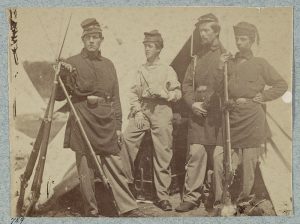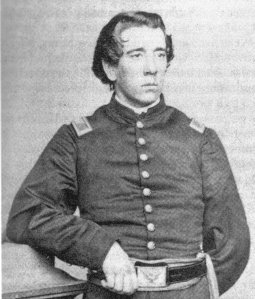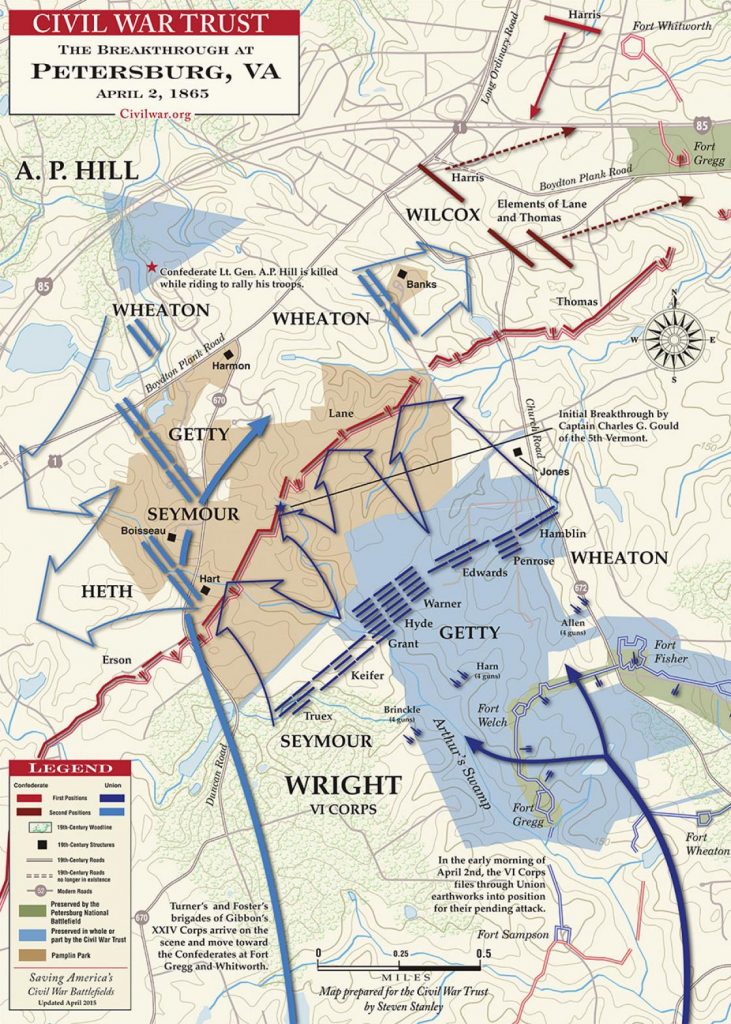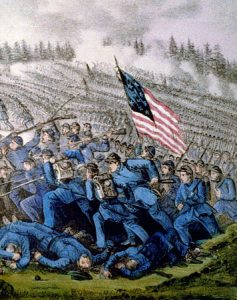“Move at the Sound of the Bugle, …Straight to the Front”

The 2nd Rhode Island Infantry Regiment formed in June 1861 and fought from First Bull Run through the Appomattox Campaign. By the opening days of April 1865, Elisha Hunt Rhodes – who had enlisted as volunteer corporal – promoted to lieutenant colonel, followed by a promotion to brevet colonel for his actions in the assault at Petersburg.
On April 2, 1865, the colonel and regiment were part of the Union XI Corps attack launched from Fort Fisher. Here is the description of the hours prior to the attack and the battle moments from Rhode’s journal.
Before Petersburg Saturday April 1st 1865
Still ready for the move with orders to be ready to attack at a moment’s notice. The enemy evidently are expecting some move on our part, for their pickets are on the alert and heavy firing is kept up. My men are very quiet, and I feel confident that they will sustain the good name of the 2nd R.I. Vols. The strain on our nerves is great, and I feel that the sooner the suspense is ended the better. We get no news at all, but every officer looks anxious. I have had my officers meet, and I have talked the situation over with them and urged them to do their duty. It was unnecessary with such men, but as I am on the best of terms with them all I felt that a word of encouragement could do no harm. Many of them I have promoted from the ranks and feel for a boy of twenty-three a fatherly interest in them.

Inside the Rebel lines at Petersburg. Sunday evening April 2nd 1865
Thank God Petersburg has fallen or at least must be evacuated tonight. Last night the Regimental commanders were ordered to Brigade Headquarters, and we received our final orders. We were told that we must succeed, as to fail would endanger the whole Army. It was a solemn gathering, and as I left Gen. Edwards took me by the hand and said: “God bless you, Colonel. Give them tomorrow morning what Paddy gave the drum, a good beating.”
I returned to my camp and had the officers assemble and again tried to impress upon their minds the gravity of the situation. About 10 P.M. all our Batteries in the Sixth Corps front opened on the enemy. The noise was terrific, and the shriek of the shot and shell gave us an idea of what we might expect in the morning. Battery “E” R.I.L.A. occupying Fort Wardsworth on the left of our camp was hard at work. Shortly after our Batteries opened our Brigade left camp.
The men were instructed to place their cups and pans inside their haversacks and under no circumstances to speak aloud or light a match. In silence we marched to Fort Fisher about four miles distant and passed through the fort and formed in front. The 6th Corps was in line of echelon by Divisions with the 1st Divisions in which we serve on the right and somewhat to the rear. Towards morning a dense fog settled down upon the field, and we could not see twenty yards in any direction. Our orders were to move at the sound of the bugle, silently but straight to the front. While waiting the enemy opened on us from the picket line, and Corporal Mill of my color guard was killed.
A detachment from the 37th Mass. Vols. with axes were to precede the line and cut away the abatis. I had ordered my men to load their muskets before leaving camp, and I now went along the line and had them take off the caps from the guns, as the officers were to lead in front, and I did not want them shot by our own men. The 2nd R.I. was in the second line of our Brigade. While waiting for the signal a mule belonging to the Brigade Pioneer Corps and loaded with picks and shovels broke loose and made for the front. The entrenching tools rattled at such a rate that the rebels through that something was up and opened a terrible fire. But for this accident I think the surprise would have been complete.

When the signal sounded the entire Corps, notwithstanding the orders to keep silent, sent up a mighty cheer and then dashed forward into the fog. As I was in the 2nd line I could not see my position very well and so moved to the right. The 2nd R.I. Vols. first struck the Rebel picket line who fired in our faces, and we went over them without firing a shot. In fact as my men had no caps on their guns we could not fire. It worked just as I had planned.
The Rebels in the rifle pits threw down their guns and surrendered. They shouted “Don’t fire, Yanks!” and I ordered them to go to the rear, which they did on the run. I hastily reformed my line in the rifle pits when Corporal Maurice O. Hearn called for “Three cheers for Colonel Rhodes!” and they were given before I could interfere. This cheering gave the enemy an idea of our position, and they opened four guns from a redoubt on my left and two guns from one on my right. I shouted “Forward!” and on we went in between the two redoubts.
As we struck the enemy’s abatis I happened to be on the right flank of the Regiment, and discovering an opening left for wagons to go through the wood I gave the proper commands which caused the Regiment to go through by the flank and then come into line in front of the two gun Batteries. The first I knew I fell into the ditch with a number of my men after me.
The Rebels fired their cannon and muskets over our heads, and then we crawled up the rope and onto the parapet of their works, stepping right among their muskets as they were aimed over the works. It was done so quick that the Rebels had no chance to fire again but dropped their guns and ran. As the 2nd R.I. reached the parapet I gave the order to prime and then fire, and we sent a volley into their huts which were in rear of the line of works.
My Acting Adjutant 1st Lieut. Frank S. Halliday shot a gunner at one of the cannon. The Rebels ran one gun out of the rear of the fort, but we were upon them so quick that they left it. Halliday then turned the gun upon the enemy and fired several rounds into their works. As they rallied to charge upon it Corporal William Railton put in a cartridge, but not having a shot filled the gun to the muzzle with stones and fired it right in the faces of the Rebels who were charging upon us. The gun burst but did not hurt any of my men, but broke up the Rebels who retreated. Not seeing any of our Brigade I hastily formed my line and followed down through the camps.

My orders were to find the Boyton Plank Road and then halt. I soon reached the road and halted. In a few moments I saw a Regiment in line advancing from the direction of the works we had captured. Not knowing who they might have been I deployed a skirmish line and soon found that it was the 49th Penn. of our Brigade Lt. Col. Hickman commanding. We remained here for a short time, and then by order received through a staff officer we marched back to the Rebel works.
The 6th Corps now formed a line at right angles with the enemy’s works and marched towards Petersburg until we struck their interior line. Here we were under fire all day, and at dark we could look down one of the main streets of the city. Lt. John K. Dorrance was severely wounded and fifteen enlisted men were killed and wounded.
After dark the officers assembled and we joined with grateful hearts in singing “Praise God From Whom All Blessings Flow.” Hurrah for the Union! It will soon be restored, thank God.
Source:
All For the Union by Elisha Hunt Rhodes, edited by Robert Hunter Rhodes, Orion Books, 1985. pages 224-226
Paragraphs were added to this presentation for easier reading and proper blog formatting.
A rousing account ! Thanks for posting.